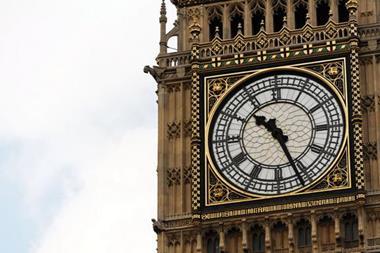Even matters such as corporate hospitality need to be scrutinised to avoid penalty
Although the UK signed up to the Organisation for Economic Co-operation and Developmen’s Convention on Combating Bribery of Foreign Public Officials in International Business Transactions as long ago as 1997, it has taken until this April for it to pass an act squaring its provisions with other elements of anti-corruption law. This has been done in the shape of a new Bribery Act, which unifies and strengthens a raft of previous legislation to do with corrupt business practices.
The Act was passed into law shortly before the recent parliamentary election, and its final implementation is supposed to happen this autumn – although the new government may now change that timescale. It is wide in its scope: in general, any bribery that takes place anywhere in the world by any individual or entity with some connection to the UK (and this will include foreign companies with subsidiaries in the UK, as well as foreign subsidiaries of UK companies) falls under the competence of the Act.
The Act consolidates and rationalises the previous hotch-potch of legislation. There are four offences under it:
• bribing – the offering, promising or giving of an advantage;
• being bribed – requesting, agreeing to receive or accepting an advantage;
• bribing a foreign public official; and
• a ‘corporate offence’, where a commercial organisation fails to prevent persons performing services on its behalf from committing bribery.
It is obvious that this last offence will be of most concern to risk managers, particularly since the penalty is an unlimited fine. Directors and senior officers are unlikely to be held personally liable, unless it can be proved they knew what was afoot. But the all-embracing scope of ‘persons performing services on its behalf’ must be looked at, for it is not confined to employees, nor indeed anyone with a formal relationship to the company.
The Act specifies that: “Whether or not A is a person who performs services for or on behalf of C is to be determined by reference to all the relevant circumstances and not merely by reference to the nature of the relationship between A and C.”
Given the sheer impracticability of an organisation being able to directly ensure the honest behaviour of a multitude of agents, subsidiaries, or indeed casual passers-by who might just be encouraged to pass over a brown envelope on an organisation’s behalf, the Act provides a defence against the ‘failure to prevent’ offence. “It is a defence for C to prove that C had in place adequate procedures designed to prevent persons associated with C from undertaking such conduct.”
Changing the culture
The Act states that the secretary of state must publish guidance about the procedures that commercial organisations can put in place to achieve this. To date, the guidance has not appeared.
However, Personnel Today has reproduced a 2009 letter from Lord Bach, which contained an outline of what was likely to be required. This states that:
• A company’s board of directors (or similar body) should take responsibility for establishing an anticorruption culture and programme.
• A senior officer should be responsible for overseeing the anti-corruption programme.
• There should be a clear and unambiguous code of conduct, including an anti-corruption element, and procedures should be established to assess the likely risks of corruption arising in a company’s business.
• Employment contracts should expressly state penalties relating to corruption.
• There should be a gifts and hospitality policy to monitor receipt of gifts and entertainment.
• Anti-corruption training should be provided.
• There should be financial controls to minimise the scope for corrupt acts to be committed.
• There should be appropriate whistleblowing procedures to enable employees to report corruption in a safe and confidential manner. Many organisations will have some or all of these procedures in place, but for those that do not, action will be needed, especially if work has not been done to establish a rigorous anti-corruption culture.
Scrutinise your risk
Mapping out the risks is one obvious place to start. Even such matters as corporate hospitality should be scrutinised to ensure that they cannot be seen as giving bribery in kind. Subsidiaries and agents will need to be fully brought up to speed (as will the head offices of foreign companies with UK subsidiaries). Finally, it would be beneficial to seek advice from your brokers or insurers.
It is also worth looking carefully at the section relating to the bribery of public officials. The Act states that an official can only be considered to be bribed where the official is neither permitted nor required by the written law applicable to him to be influenced in his capacity as a foreign public official by the offer, promise or gift.
But the definition of ‘the written law applicable to him’ in this context includes the law of any part of the UK. So, although the local law may be silent on the matter, if an organisation’s actions would be illegal under UK law, the organisation is at risk of being held liable.
For a number of reasons, among them the country’s dubious record on corruption, a freshly energetic new government and a lingering sense of distaste following the calling off of the Serious Fraud Office’s investigation into BAE, it is likely that UK prosecutors will be keen to make examples of companies found to be less than honest in their business dealings. It will be better to be safe than sorry.



















